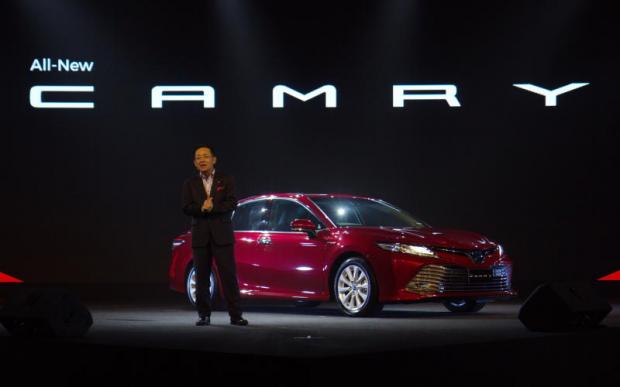
After staring the possibility of a shortage of batteries for hybrid cars imported from Japan, Toyota Motor Thailand decided to accelerate the start of its battery assembly in Chachoengsao province to mid-2019, up from early 2020.
Battery assembly production is part of Toyota's total investment of 19 billion baht for hybrid electric vehicles (EVs) at the Gateway plant in Chachoengsao.
The Board of Investment (BoI) said Toyota plans to assemble 7,000 hybrid EVs a year, making 70,000 batteries for EVs and producing other parts such as doors, bumpers and front/rear axles, totalling 9.1 million units.
Assembly production of batteries alone is worth 216 million baht of the total budget.
Chatchai Taveesakulvadchara, executive vice-president of the company, said the local battery assembly plant is expected to produce a nickel metal hydride (NiMH) version that Toyota's hybrid EVs sold in the Thai market have to use.
"NiMH batteries are suitable for the country's hot and humid weather," said Mr Chatchai.
"But Toyota is not abandoning lithium-ion batteries, which we will develop in the future."
He said the localisation of NiMH batteries will just ease the shortage that for Toyota's operation in Thailand, but the actual problem is a lack of battery cells in the main facilities in Japan and China.
The battery plants in Japan's Omori, Sakaijuku and Miyagi are the only three sites to supply nickel-metal hydride batteries for Toyota hybrid EVs globally.
The three plants in Japan have a production capacity of 1.4 million batteries per year under a joint-venture firm, Primearth EV Energy Co, in which Toyota Motor Corporation holds a majority stake of 80.5% and Panasonic Corporation owns the rest.
Primearth also has an affiliate company in Jiangsu, China, with a capacity of 100,000 batteries per year.
President Michinobu Sugata said Toyota Motor Thailand will handle the battery manufacturing alone at the Gateway plant and there is no crossover with Toyota's partnership with Primearth.
For the Gateway plant, Toyota has to produce up to 100,000 batteries per year to meet economies of scale.
"The economies of scale means Toyota can use local contents completely," Mr Sugata said.
"After starting the battery assembly production, Toyota will try to seek at least 10 local suppliers for this vital part in the near future."
Under the government's EV scheme, Toyota is the first carmaker to win BoI privileges and start local production at the Gateway plant, which handles all of Toyota's passenger cars.
Toyota produces two hybrid EVs -- the C-HR sport utility vehicle and the Camry sedan.
The 8th generation of the Camry was launched yesterday, priced 1.445-1.799 million baht.
The hybrid version enjoys an excise tax discount under the EV scheme, which makes retail prices cheaper by 60,000-70,000 baht.
Toyota sold 323 Camry units and 8,800 C-HRs, all hybrid EVs, over the first nine months.